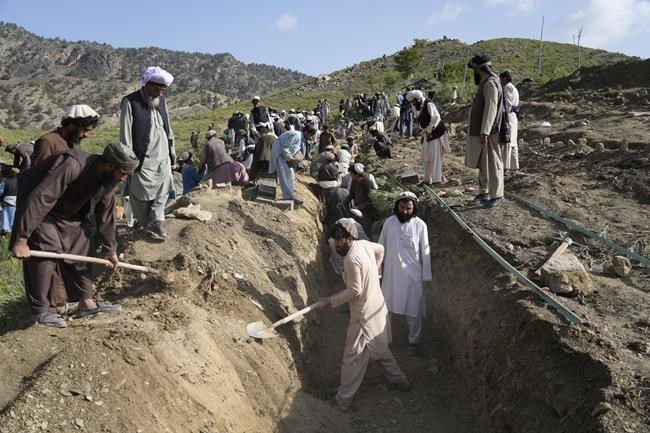
Afghans dig a trench for a common grave for their relatives killed in an earthquake to a buria site l in Gayan village, in Paktika province, Afghanistan, Thursday, June 23, 2022. Some Afghan-Canadians say they are worried Wednesday's magnitude 6 earthquake in eastern Afghanistan could heighten the country's already dire humanitarian crisis. THE CANADIAN PRESS/AP-Ebrahim Nooroozi
Republished June 24, 2022 - 2:34 PM
Original Publication Date June 24, 2022 - 10:36 AM
Some Afghan-Canadians say they are worried Wednesday's magnitude 6 earthquake in eastern Afghanistan could heighten the country's already dire humanitarian crisis.
Afghan state media said the earthquake's death toll is now 1,150, with about 3,000 people injured, after a 4.2 magnitude aftershock took more lives on Friday. Close to 3,000 homes have also been destroyed or badly damaged, according to the reports.
"I was very shattered," said Nooria Kamran, the co-founder and executive director of Children Without Borders, an Afghan-Canadian organization addressing child labour in Afghanistan.
"It was very shocking because what's been going on in Afghanistan, every day you wake up, there's something new, there's something more shocking than what happened yesterday," she said.
So far, the humanitarian response has lagged in both size and speed due to the lack of pre-positioned supplies and the level of hunger and poverty that already exist in Afghanistan. Heavy rains and winds have also hampered rescue efforts.
Children Without Borders had personnel on the ground delivering food packages and funds for medical treatment in Paktika province, the earthquake's epicentre. Kamran said the province's rural and mountainous landscape is making it more difficult for organizations to deliver aid.
"There's a lack of medical treatment, there's a lack of food, there's all kinds of needs in Afghanistan right now," Kamran said.
Houses in the area also have a weaker structure than those in Afghan cities, making them more susceptible to collapse, she said.
Thousands of stone and mud-brick homes crumbled in the quake, often trapping whole families in the rubble. Many of those who survived spent the first night outside in a cold rain. Since then, villagers have been burying their dead and digging through the rubble by hand in search of survivors.
Afghanistan was already facing the worst humanitarian crisis in recent history after the Taliban took control of the country last year, and an earthquake on top of that is "unbelievable" and "heartbreaking," said Adeena Niazi, the founder and executive director of the Toronto-based Afghan Women's Organization.
Afghanistan is grappling with staggering poverty at a time when the country as a whole is spiralling deeper into an economic crisis after many countries pulled back critical financing and development aid in the wake of the Taliban's takeover.
"The health system in Afghanistan has almost collapsed, hospitals are closed because they don't receive aid," Niazi said.
"It's already a huge crisis with medical services but now with this earthquake, I don't know what will happen," she said, adding that many Afghans stuck under rubble could die without access to medical treatment.
Niazi said she is worried the international community my not rush to aid earthquake victims in Afghanistan out of hesitance to hand funds and resources over to the Taliban-controlled government.
The country's international isolation is also complicating relief efforts since fewer aid organizations have a presence in the country.
To show that aid for earthquake victims is welcome, the Taliban's supreme leader, Haibatullah Akhundzada, who hardly ever appears in public, asked the international community and humanitarian organizations "to help the Afghan people affected by this great tragedy and to spare no effort."
The current government in Afghanistan is desperate to get help to its people, Niazi said. "I know (the Taliban) are against women, they are against women's education, but ... they don't have the capacity, they don't have the resources, they cannot do anything," she said.
"The people are victimized by the Taliban and also they are easy to ignore. They are punished by the international community because they are ruled by the Taliban," Niazi added.
Global Affairs Canada said the federal government remains deeply concerned about the continuing humanitarian crisis in Afghanistan.
"Canada is saddened to learn of the tragic loss of life as a result of the recent earthquake in Afghanistan. Canada offers its heartfelt sympathies to all victims and their families," it said in a statement.
The department said it is not aware of any Canadians affected by the earthquake but will continue to monitor the situation closely and continue to support experienced humanitarian organizations that meet all of its requirements to respond to the needs of vulnerable Afghans.
In March, Canada allocated $143 million in humanitarian assistance to support vulnerable populations in Afghanistan and neighbouring countries.
-- With files from Jordan Omstead and The Associated Press.
This report by The Canadian Press was first published June 24, 2022.
News from © The Canadian Press, 2022